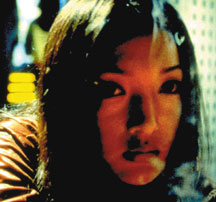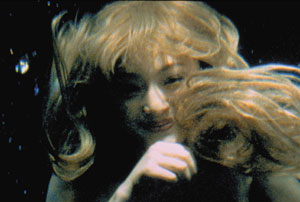WET BEHIND THE EARS
Suzhou River and its little mermaid, Zhou Xun.
 |  |
| Zhou Xun in the dual role of Moudan and Meimei in Suzhou River. | |
Along the filthy spill that is the Suzhou River, Shanghai’s main arterial waterway, a double story unfolds. Two men, one a videographer, the other a motorcycle deliveryman, become entranced by a waif, and as the camera darts and dives, they confess their obsessions, whimsically and at length, voiceover style. At first the waif’s name is Moudan; after she plunges into the river and disappears, she returns – maybe – as Meimei. Are they one and the same?
Meimei is a mermaid, but she works in a sleazy nightclub, drowning herself in vodka and toying with a finned Barbie doll. She’s the stuff that dreams – and arthouse love stories – are made of: a Lolita from the bilge; erotic, illusive, her broad, devouring lips ever smacking together, blowing gum-bubbles, telling lies. Scrutinized while pissing, and given to nuzzling the camera like a puppy or a first boyfriend, she is the reason for, and the radiance within, Suzhou River, a Chinese-German co-production directed by 25-year-old Lou Ye.
Both Meimei and Moudan are played by a young Chinese actress named Zhou Xun, a doe-eyed glimpse of the sublime. Directed with borrowed panache, Suzhou River wears its influences like a succession of party hats.
A heavily voiceovered voyage through smudgy textures and lyrical smears, you might call it Wong Kar-wai’s Vertigo – every film critic in America likely will. Ye, 35, discourages that association but admits that the bulk of his film-historical education was gleaned from bootleg videos of European and Hollywood features. Given Suzhou River’s movie-mad chaos, its teenage sex appeal and arty auteur sleaze, calling it Brian DePalma’s The Little Mermaid might do just as well. Suzhou River isn’t exactly groundbreaking, but Xun’s pouting face and awkward grace come off as some kind of iconic super-event. (Andy Warhol could have spent an hour just watching her suck her thumb.)
First seen in Chen Kaige’s The Emperor and The Assassin, as a sightless and ethereal child bride, Xun is currently leading a career covered in blossoms: she’s just finished working on two new mainland Chinese indies – Wang Xiaoshuai’s Bicycle Blues and Zhang Yuan’s Hainan Plus – as well as Hollywood Hong Kong, a new feature from the ever-prolific Hong Kong director Fruit Chan. At 23 years old, Xun is already a popular television star. Director Ye sees himself as a part of the so-called Sixth Generation of mainland Chinese filmmakers, but, he explains, "We’re also sometimes called the 386Mhz generation: three for ‘over thirty,’ eight for ‘educated in the ’80s, ‘six’ because we were born in the ’60s." Suzhou River – which picked up the Golden Tiger award in Rotterdam and was featured in the New Directors/New Films 2000 – is his second film; Weekend Lovers, his first, won the Mannheim-Heidelberg film festival’s Fassbinder/Best Director prize in 1996. Since then Ye has worked extensively (as many 386ers do) in television, and he is both the producer of "Super City" – a collection of 10 films by young graduates of the Beijing Film Academy, and the first digital film project in China – and the founder of Dream Factory, an independent film production company.
With so many start-ups from this upstart, Ye’s reputation, both in China and abroad, is growing by the minute. American audiences can get a glimpse of Suzhou River (and develop their own fixations on Zhou Xun) when Strand Releasing gets the movie into theaters this fall. But will the notoriously obstinate Chinese censors ever let Suzhou River play in the city where it was made? That answer is yet to come, but if and when that day arrives, there will still be one big question on Lou Ye’s mind: What will the Seventh Generation have to say? – Chuck Stephens
VOD CALENDAR


 See the VOD Calendar →
See the VOD Calendar →


